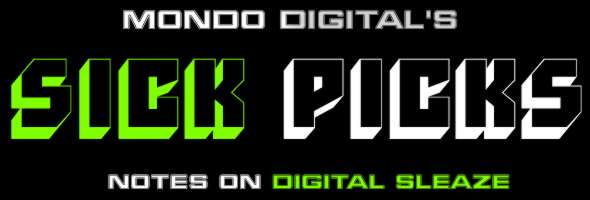

AUGUST 11, 2010
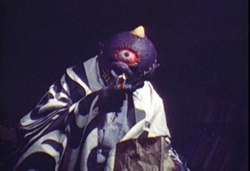 Winning this month's truth in advertising award, the Super 8 acid trip Psychedelic Glue Sniffin' Hillbillies delivers glue sniffing, more than one hillbilly, and a whole lotta psychedelia. Available directly from the website of director Craig Smith, this half-hour "cinema verite trip into the blown-out mind of psyched out rural USA" applies the techniques of Kenneth Anger and Stan Brakhage, among others, to the deranged ramblings of a pair of backwoods West Virginia residents, Jimmy and Dutch, who will apparently shove anything chemical-related up their nostrils. Like a cinematic carnival ride, this has floated around on the fan circuit for quite some time thanks to its irresistible title and a seriously freaked-out soundtrack by cult favorite Helios Creed. This will probably always remain an underground title thanks to the copious injection of TV clips (including an extended bit from Rock 'n' Roll High School), but that's probably for the best as this is best discovered with a little effort. The super-packed DVD comes with a brisk director commentary, four equally bonkers short films ("Mother Sky," "Mount Pleasant," "Hippy Crack Porn," and "In a State of Equilibrium"), "Harold's Jukebox" (featuring a quartet of oddly haunting, very minimalist performances by Harold Nobel Lewis), outtakes, some random sound bits dubbed "Philosophy of Jimmy and Dutch," and a DVD-Rom folder with a bunch of extra print and image goodies.
Winning this month's truth in advertising award, the Super 8 acid trip Psychedelic Glue Sniffin' Hillbillies delivers glue sniffing, more than one hillbilly, and a whole lotta psychedelia. Available directly from the website of director Craig Smith, this half-hour "cinema verite trip into the blown-out mind of psyched out rural USA" applies the techniques of Kenneth Anger and Stan Brakhage, among others, to the deranged ramblings of a pair of backwoods West Virginia residents, Jimmy and Dutch, who will apparently shove anything chemical-related up their nostrils. Like a cinematic carnival ride, this has floated around on the fan circuit for quite some time thanks to its irresistible title and a seriously freaked-out soundtrack by cult favorite Helios Creed. This will probably always remain an underground title thanks to the copious injection of TV clips (including an extended bit from Rock 'n' Roll High School), but that's probably for the best as this is best discovered with a little effort. The super-packed DVD comes with a brisk director commentary, four equally bonkers short films ("Mother Sky," "Mount Pleasant," "Hippy Crack Porn," and "In a State of Equilibrium"), "Harold's Jukebox" (featuring a quartet of oddly haunting, very minimalist performances by Harold Nobel Lewis), outtakes, some random sound bits dubbed "Philosophy of Jimmy and Dutch," and a DVD-Rom folder with a bunch of extra print and image goodies.
 If it weren't for the 2009 copyright date, you could easily mistake the gore-splashed, candy-colored Brainjacked for a product from the feverish heyday of late '80s VHS horror. Shot in H.G. Lewis' old stomping grounds of St. Petersburg, Florida, this lurid tale follows the questionable scientific methods being conducted at The Garden, a treatment facility run by the awfully committed Dr. Karas (Rod Grant). Enter new patient Tristan (Chris Jackson), a runaway suffering from extreme, debilitating migraines, who becomes a guinea pig in the doctor's latest pet therapy: drilling holes in people's skulls. Unfortunately, this didn't work so well for Michael Ironside in Scanners, and it's even less effective here as the remedy also renders people awfully susceptible to the doc's commands, and soon the whole place turns into one big, freaky, blood-spattered playground of utter mayhem. Despite a somewhat overzealous, fractured opening, Brainjacked quickly settles into a fun groove of cheap thrills and wild stylish flourishes, with firstie filmmaker Andrew Allan indulging in a wild palette of colors that look like an unholy cross between Suspiria and Cafe Flesh. Unearthed's screener disc didn't contain any extras, but hopefully the final product will have a little crew participation to go along with the rampant cranium puncturing. Good, skull-spurting fun.
If it weren't for the 2009 copyright date, you could easily mistake the gore-splashed, candy-colored Brainjacked for a product from the feverish heyday of late '80s VHS horror. Shot in H.G. Lewis' old stomping grounds of St. Petersburg, Florida, this lurid tale follows the questionable scientific methods being conducted at The Garden, a treatment facility run by the awfully committed Dr. Karas (Rod Grant). Enter new patient Tristan (Chris Jackson), a runaway suffering from extreme, debilitating migraines, who becomes a guinea pig in the doctor's latest pet therapy: drilling holes in people's skulls. Unfortunately, this didn't work so well for Michael Ironside in Scanners, and it's even less effective here as the remedy also renders people awfully susceptible to the doc's commands, and soon the whole place turns into one big, freaky, blood-spattered playground of utter mayhem. Despite a somewhat overzealous, fractured opening, Brainjacked quickly settles into a fun groove of cheap thrills and wild stylish flourishes, with firstie filmmaker Andrew Allan indulging in a wild palette of colors that look like an unholy cross between Suspiria and Cafe Flesh. Unearthed's screener disc didn't contain any extras, but hopefully the final product will have a little crew participation to go along with the rampant cranium puncturing. Good, skull-spurting fun.
 Preceding the mainstream arrival of the X Games by a few decades, the world's first skatesploitation film, Skateboard: The Movie, has lingered as something of a fan favorite since its VHS days and also holds some note as one of character actor Allen Garfield's rare leading roles after the nutty Cry Uncle. Here he plays a middle-aged talent scout named Manny Bloom who decides to put together a big league skateboard team dubbed the LA Wheels... who might be able to get him out of debt if they make the big time. The kids he recruits have problems of their own, and their ability to make it to the big championship game is put into serious doubt when internal and external conflicts begin to pile up. Also featuring teen heartthrob Leif Garret (post-Devil Times Five), sitcom regular Gordon Jump, and a completely unexpected turn by deep-voiced AIP regular Antony Carbone (Pit and the Pendulum), this is really just an excuse to show off lots of flashy skateboard work by talented kids in the early days of a fast-growing sport. The clothes, the cars, the hair... yep, this is pure late '70s cinematic gold. Somehow Universal let the rights to this lapse, which means Scorpion got to snap it up for DVD with a pretty slick anamorphic transfer that looks about as fresh as an opening weekend print. Surprisingly, the original soundtrack with plenty of '70s power pop appears to be completely intact. Extras include the original trailer ("with Leif Garrett and 40 of America's Greatest Skateboarders!"), an interesting 17-minute chat with actor and star skateboarder Tommy Alva, a solo chat with director George Gage about creating his film in the wild 1978 film environment at Universal Studios, and both star and director joining together for another quick video piece showing off a very singular prop. More importantly, they also team up for an audio commentary in which they talk at length about each of the cast members, who were literally recruited from every walk of life imaginable.
Preceding the mainstream arrival of the X Games by a few decades, the world's first skatesploitation film, Skateboard: The Movie, has lingered as something of a fan favorite since its VHS days and also holds some note as one of character actor Allen Garfield's rare leading roles after the nutty Cry Uncle. Here he plays a middle-aged talent scout named Manny Bloom who decides to put together a big league skateboard team dubbed the LA Wheels... who might be able to get him out of debt if they make the big time. The kids he recruits have problems of their own, and their ability to make it to the big championship game is put into serious doubt when internal and external conflicts begin to pile up. Also featuring teen heartthrob Leif Garret (post-Devil Times Five), sitcom regular Gordon Jump, and a completely unexpected turn by deep-voiced AIP regular Antony Carbone (Pit and the Pendulum), this is really just an excuse to show off lots of flashy skateboard work by talented kids in the early days of a fast-growing sport. The clothes, the cars, the hair... yep, this is pure late '70s cinematic gold. Somehow Universal let the rights to this lapse, which means Scorpion got to snap it up for DVD with a pretty slick anamorphic transfer that looks about as fresh as an opening weekend print. Surprisingly, the original soundtrack with plenty of '70s power pop appears to be completely intact. Extras include the original trailer ("with Leif Garrett and 40 of America's Greatest Skateboarders!"), an interesting 17-minute chat with actor and star skateboarder Tommy Alva, a solo chat with director George Gage about creating his film in the wild 1978 film environment at Universal Studios, and both star and director joining together for another quick video piece showing off a very singular prop. More importantly, they also team up for an audio commentary in which they talk at length about each of the cast members, who were literally recruited from every walk of life imaginable.
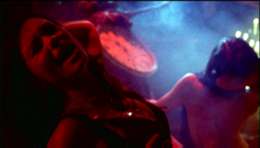 For reasons never made remotely clear, the 2009 satanic shocker Finale has been passing itself off as an American homage to giallo filmmaking in general (and an Argento homage in particular) ever since its original fest appearances. Well, forget that completely; the complete absence of any mystery, a black-gloved killer, sexy victims, or operatic production design ensure this has nothing to do with any Italian thriller ever made, and the only Argento movie this resembles even remotely is Mother of Tears. Take away the silly hype, and you're left with a competent if muddled devilish stew about a concerned mom (Carolyn Hauck) and daughter (Suthi Picotte) who don't believe the family's oldest son killed himself, most evidence to the contrary. For one thing, he slapped black paint all over his mirrors and had his bedroom booby trapped, which of course means a diabolical cult was after him. Much hallucinatory writing, bloodshed, and goth shenanigans ensue before the gory, ahem, finale which literally unfolds on a theater stage. First-time director John Michael Elfers has a solid eye for composition and color design, though he indulges in a few too many "scary" visual gimmicks that were already worn to death by Nine Inch Nails videos. Keep an eye out, though; with a bit more polish he could turn into a talent to watch. Image's disc features a respectable anamorphic transfer, a making-of featurette, deleted scenes, and a trailer.
For reasons never made remotely clear, the 2009 satanic shocker Finale has been passing itself off as an American homage to giallo filmmaking in general (and an Argento homage in particular) ever since its original fest appearances. Well, forget that completely; the complete absence of any mystery, a black-gloved killer, sexy victims, or operatic production design ensure this has nothing to do with any Italian thriller ever made, and the only Argento movie this resembles even remotely is Mother of Tears. Take away the silly hype, and you're left with a competent if muddled devilish stew about a concerned mom (Carolyn Hauck) and daughter (Suthi Picotte) who don't believe the family's oldest son killed himself, most evidence to the contrary. For one thing, he slapped black paint all over his mirrors and had his bedroom booby trapped, which of course means a diabolical cult was after him. Much hallucinatory writing, bloodshed, and goth shenanigans ensue before the gory, ahem, finale which literally unfolds on a theater stage. First-time director John Michael Elfers has a solid eye for composition and color design, though he indulges in a few too many "scary" visual gimmicks that were already worn to death by Nine Inch Nails videos. Keep an eye out, though; with a bit more polish he could turn into a talent to watch. Image's disc features a respectable anamorphic transfer, a making-of featurette, deleted scenes, and a trailer.
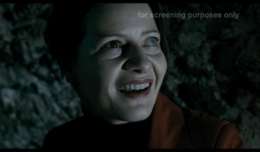 Also flawed but intriguing is the unpredictable 2009 Czech horror film T.M.A., retitled Darkness for its American DVD debut courtesy of Vicious Circle Films. One of the country's more venerable directors, Juraj Herz (best known for 1969's The Cremator), reinvents himself right from the opening as he intercuts a goth band performing before a nightclub crowd with a nosy patron in another room losing an eyeball, Lucio Fulci style. The bulk of the film follows troubled Marek (Ivan Franek), one of the musicians, who yearns to escape the bustling city life and settles back in his hometown, specifically a haunted house with a dark history dating back to the Nazi occupation. The local townspeople are a colorful and awfully randy bunch with more than their fair share of hot women, though Marek's bed conquests don't turn out quite as expected. All of the plot threads weave together, sort of, as the film glides to an eerie and somewhat baffling conclusion. Most surprisingly, Darkness also injects a number of surprisingly strong, graphic sex scenes, including a fleeting bit of hardcore imagery (with a little prosthetic enhancement); it's weird Warner Brothers had no problem releasing this in Europe, yet The Devils is still languishing in their vaults. Go figure. Vicious Circle's screener looks fine with a dark but atmospheric 16x9 transfer and English subtitles; no word on whether anything will be added to the final product.
Also flawed but intriguing is the unpredictable 2009 Czech horror film T.M.A., retitled Darkness for its American DVD debut courtesy of Vicious Circle Films. One of the country's more venerable directors, Juraj Herz (best known for 1969's The Cremator), reinvents himself right from the opening as he intercuts a goth band performing before a nightclub crowd with a nosy patron in another room losing an eyeball, Lucio Fulci style. The bulk of the film follows troubled Marek (Ivan Franek), one of the musicians, who yearns to escape the bustling city life and settles back in his hometown, specifically a haunted house with a dark history dating back to the Nazi occupation. The local townspeople are a colorful and awfully randy bunch with more than their fair share of hot women, though Marek's bed conquests don't turn out quite as expected. All of the plot threads weave together, sort of, as the film glides to an eerie and somewhat baffling conclusion. Most surprisingly, Darkness also injects a number of surprisingly strong, graphic sex scenes, including a fleeting bit of hardcore imagery (with a little prosthetic enhancement); it's weird Warner Brothers had no problem releasing this in Europe, yet The Devils is still languishing in their vaults. Go figure. Vicious Circle's screener looks fine with a dark but atmospheric 16x9 transfer and English subtitles; no word on whether anything will be added to the final product.
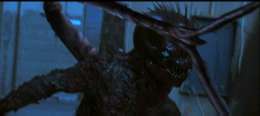 Continuing our blandly-titled "dark" theme, the American indie horror film The Blackout from 2009 has yet screen widely in its native country but is available on DVD in the UK. This disposable but sporadically entertaining nuts-and-bolts monster movie pretty much follows the template that's been around since the '50s: get a group of people in an isolated location, then have a beastie pick them off without clearly showing the monster until the big finale. In this case, it's a bunch of Angelenos stuck in a high rise on Christmas Eve when their various festivities are interrupted by random, city-wide disruptions like blackouts and strange gas eruptions from the ground. Turns out there's a carnivorous creature -- or perhaps more than one -- with a nasty, scorpion-style tail lurking in the dark, and it's hungry. Also like a '50s programmer, you have to deal with some pretty cardboard characters and a lot of filler to get to the good stuff, but the lively climax in an elevator shaft delivers some surprisingly potent thrills and the gore flies fast and furious once the monster decides to stop playing hide and seek. (Too bad one great payoff shot had to be spoiled with CG a la Midnight Meat Train, but at least most of the blood is real.) Also, the apocalyptic ending is a real head scratcher that will either leave viewers amused at its audaciousness or ready to chuck a soda can at the screen. Kaleidoscope's DVD features an attractive anamorphic 2.35:1 transfer that does a pretty good job considering 80% of the film takes place in very dim lighting; audio options are 5.1 and stereo, with the former actually showing off a pretty good sound mix and music score. Apart from a lot of unrelated promotional trailers, there are no extras.
Continuing our blandly-titled "dark" theme, the American indie horror film The Blackout from 2009 has yet screen widely in its native country but is available on DVD in the UK. This disposable but sporadically entertaining nuts-and-bolts monster movie pretty much follows the template that's been around since the '50s: get a group of people in an isolated location, then have a beastie pick them off without clearly showing the monster until the big finale. In this case, it's a bunch of Angelenos stuck in a high rise on Christmas Eve when their various festivities are interrupted by random, city-wide disruptions like blackouts and strange gas eruptions from the ground. Turns out there's a carnivorous creature -- or perhaps more than one -- with a nasty, scorpion-style tail lurking in the dark, and it's hungry. Also like a '50s programmer, you have to deal with some pretty cardboard characters and a lot of filler to get to the good stuff, but the lively climax in an elevator shaft delivers some surprisingly potent thrills and the gore flies fast and furious once the monster decides to stop playing hide and seek. (Too bad one great payoff shot had to be spoiled with CG a la Midnight Meat Train, but at least most of the blood is real.) Also, the apocalyptic ending is a real head scratcher that will either leave viewers amused at its audaciousness or ready to chuck a soda can at the screen. Kaleidoscope's DVD features an attractive anamorphic 2.35:1 transfer that does a pretty good job considering 80% of the film takes place in very dim lighting; audio options are 5.1 and stereo, with the former actually showing off a pretty good sound mix and music score. Apart from a lot of unrelated promotional trailers, there are no extras.
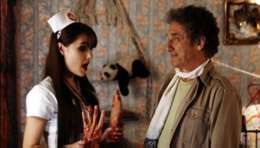 A film that feels like it was conceived during a late intoxicated night at a horror convention, the shot-on-DV Smash Cut definitely wins a chutzpah badge for bringing together the unlikely combo of David Hess (Last House on the Left), Michael Berryman (The Hills Have Eyes), hambone Ray Sager (The Wizard of Gore), director Herschell Gordon Lewis (Blood Feast), and, uh, porn actress Sasha Grey right before making Steven Soderbergh's dullest movie. The story is another retread of A Bucket of Blood but shot with an H.G. Lewis aesthetic as struggling schlock filmmaker Able Whitman (Hess) finds much-needed inspiration for his new film when his involvement in a car crash provides him with a female corpse ripe for filming. Soon he's mounting an entire production whose dead bodies look awfully realistic, but how long can he keep it up without being discovered by a snooping reporter (Grey) or going completely off the deep end? Almost completely ineffective as a horror film, this amusing little sick joke for cult film fans piles on gallons of blood and colorful lighting for an eye-catching homage to the early days of cinematic gore. The arch performances (except for Gray, who seems to be in a whole different movie) are definitely an acquired taste and constantly feel at odds with any attempts to shock the viewer, but the opportunity to see Hess carrying a lead role again is pretty much worth the effort by itself. Media Blasters' DVD offers a solid representation of the original digital video lensing, which still can't come close to capturing the mood and texture of real film. Dolby Digital 5.1 and stereo options are pretty much interchangeable, while extras include a Sasha Gray video diary, a gag reel, the trailer, a whopping 20 cut and extended scenes, two brief behind-the-scenes featurettes, a "Bobo Terror Toy 2" short extrapolated from the main feature, and a pretty solid audio commentary with director Lee Demarbre (Jesus Christ Vampire Hunter), actress Jennilee Murray, writer Ian Driscoll, composer Michael Dubue, and post supervisor Andre Coutu. As usual with commentaries featuring the participants, it's a little crowded and confusing at points but certainly never gets boring.
A film that feels like it was conceived during a late intoxicated night at a horror convention, the shot-on-DV Smash Cut definitely wins a chutzpah badge for bringing together the unlikely combo of David Hess (Last House on the Left), Michael Berryman (The Hills Have Eyes), hambone Ray Sager (The Wizard of Gore), director Herschell Gordon Lewis (Blood Feast), and, uh, porn actress Sasha Grey right before making Steven Soderbergh's dullest movie. The story is another retread of A Bucket of Blood but shot with an H.G. Lewis aesthetic as struggling schlock filmmaker Able Whitman (Hess) finds much-needed inspiration for his new film when his involvement in a car crash provides him with a female corpse ripe for filming. Soon he's mounting an entire production whose dead bodies look awfully realistic, but how long can he keep it up without being discovered by a snooping reporter (Grey) or going completely off the deep end? Almost completely ineffective as a horror film, this amusing little sick joke for cult film fans piles on gallons of blood and colorful lighting for an eye-catching homage to the early days of cinematic gore. The arch performances (except for Gray, who seems to be in a whole different movie) are definitely an acquired taste and constantly feel at odds with any attempts to shock the viewer, but the opportunity to see Hess carrying a lead role again is pretty much worth the effort by itself. Media Blasters' DVD offers a solid representation of the original digital video lensing, which still can't come close to capturing the mood and texture of real film. Dolby Digital 5.1 and stereo options are pretty much interchangeable, while extras include a Sasha Gray video diary, a gag reel, the trailer, a whopping 20 cut and extended scenes, two brief behind-the-scenes featurettes, a "Bobo Terror Toy 2" short extrapolated from the main feature, and a pretty solid audio commentary with director Lee Demarbre (Jesus Christ Vampire Hunter), actress Jennilee Murray, writer Ian Driscoll, composer Michael Dubue, and post supervisor Andre Coutu. As usual with commentaries featuring the participants, it's a little crowded and confusing at points but certainly never gets boring.
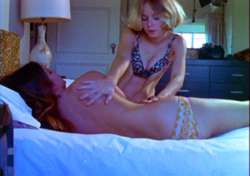 By this point, Northern California sexploitation director Nick Phillips has become one of the most reliable properties from the DVD folks at Secret Key, who have managed to salvage dozens of his idiosyncratic, fetishistic, lesbo-lovin' chamber pieces from obscurity. The triple header found in his San Francisco Sex Collection features a solid cross-section of his work from gritty B&W to lurid, overheated color, kicking off with Oddo, a jazzy, bizarre precursor to Forced Entry and Combat Shock about a shellshocked Vietnam vet (Martin Donely) who finds himself unable to cope with life back in the big city, where he has to deal with an abusive dad, a lesbian stepmom, belligerent punks, angry drunks... and a murderous impulse to kill at any minute. Though it features some sexploitation trappings, this is considerably more downbeat than even your average roughie; not surprisingly, it does not end very well for anyone involved. The violence is very subdued here compared to subsequent 'Nam vet exploitation films, but Phillips ensures there's enough female flesh on display to keep this booked in grindhouses who might not notice the bitter social content. The much lighter and stranger 1968 fantasy Scyla also uses skin to sell a peculiar hippie version of the Greek myth about a girl who falls under the spell of a love potion given to a sailor by the witch Circe. Actually this was shot more in L.A. than San Fran, but that's okay since the same mood prevails and you get some great views of Venice and Santa Monica's beaches a few years after Dennis Hopper strolled nearby in Night Tide, to which this bears a few interesting parallels. Finally the color How I Got My Mink (1969) is another spin on the whole "counterculture filmmaker tries to bend reality to his whim" storyline that fueled loads of studio films at the time, including Cover Me Babe, The Wild Eye, and Medium Cool. This time a brother and sister decide to take their cameras to the streets and show how it really is, man, even if that means banging all of their documentary subjects to get to the truth. Not surprisingly, sis gets to explore her sapphic side while bro discovers that hippie chicks make really good film subjects, even if it's against their will. For once it doesn't all end in tears, which is a surprising note to end this oddball set. All three films are presented full frame (yay, no fake cropping!) and look fresh out of the vault for the most part. The only extras are the usual abundance of Nick Phillips trailers (many starring Uschi Digart, of course) and very good liner notes by Media Funhouse's Ed Grant, who points out lots of little art direction choices and gives some useful context for each of the films.
By this point, Northern California sexploitation director Nick Phillips has become one of the most reliable properties from the DVD folks at Secret Key, who have managed to salvage dozens of his idiosyncratic, fetishistic, lesbo-lovin' chamber pieces from obscurity. The triple header found in his San Francisco Sex Collection features a solid cross-section of his work from gritty B&W to lurid, overheated color, kicking off with Oddo, a jazzy, bizarre precursor to Forced Entry and Combat Shock about a shellshocked Vietnam vet (Martin Donely) who finds himself unable to cope with life back in the big city, where he has to deal with an abusive dad, a lesbian stepmom, belligerent punks, angry drunks... and a murderous impulse to kill at any minute. Though it features some sexploitation trappings, this is considerably more downbeat than even your average roughie; not surprisingly, it does not end very well for anyone involved. The violence is very subdued here compared to subsequent 'Nam vet exploitation films, but Phillips ensures there's enough female flesh on display to keep this booked in grindhouses who might not notice the bitter social content. The much lighter and stranger 1968 fantasy Scyla also uses skin to sell a peculiar hippie version of the Greek myth about a girl who falls under the spell of a love potion given to a sailor by the witch Circe. Actually this was shot more in L.A. than San Fran, but that's okay since the same mood prevails and you get some great views of Venice and Santa Monica's beaches a few years after Dennis Hopper strolled nearby in Night Tide, to which this bears a few interesting parallels. Finally the color How I Got My Mink (1969) is another spin on the whole "counterculture filmmaker tries to bend reality to his whim" storyline that fueled loads of studio films at the time, including Cover Me Babe, The Wild Eye, and Medium Cool. This time a brother and sister decide to take their cameras to the streets and show how it really is, man, even if that means banging all of their documentary subjects to get to the truth. Not surprisingly, sis gets to explore her sapphic side while bro discovers that hippie chicks make really good film subjects, even if it's against their will. For once it doesn't all end in tears, which is a surprising note to end this oddball set. All three films are presented full frame (yay, no fake cropping!) and look fresh out of the vault for the most part. The only extras are the usual abundance of Nick Phillips trailers (many starring Uschi Digart, of course) and very good liner notes by Media Funhouse's Ed Grant, who points out lots of little art direction choices and gives some useful context for each of the films.
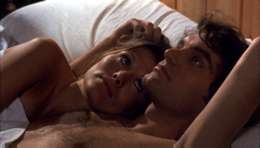 Jumping forward to the '70s, we now run smack into a modest, appealing slice of Canadian pop culture, The Girl in Blue (also released as U-Turn). Though it barely made a blip in theaters in 1973, it became a VHS mainstay thanks to the prominent appearance of supermodel Maud Adams, who appeared in The Man with the Golden Gun one year later and went on to a truly bizarre film career. Self-centered lawyer Scott (Dark Shadows' David Selby) has been haunted for years by a beautiful woman (Adams) he saw on a ferry, and when his girlfriend (Gay Rowan) starts pushing for a commitment, he decides to scour Montreal in search of his dream girl to find out whether something better is indeed out there. Adams really isn't in the film much at all for the first half, but Selby, one of the more reliable TV actors out there, manages to make his jackass character more watchable than you'd expect and carries the film pretty well. (For the record, this print also contains some tasteful nude shots of Adams and Selby that were either darkened, cropped, or removed from New World's VHS version, though they were always in theatrical prints.) The real highlight here is the infectious music score by Canadian composer Neil Chotem, which ranges from Peanuts-style piano jazz to lush vocalizing reminiscent of Ennio Morricone. Hungarian director George Kaczender (who went on to helm the truly deranged Your Ticket Is No Longer Valid) and Selby appear on Scorpion's DVD for a good audio commentary in which they talk about working with Adams (as well as the "exhibitionistic" Rowan) and capturing the unique flavor of Montreal and its surrounding nautical areas, while Selby also provides a separate video intro. (It's nice to see him still getting work in HBO shows and David Fincher movies.) Gay Rowan also pops up for a separate interview in which she talks about how she got the role and her memories of her fellow actors. An alternate main title sequence and the original trailer round out a pleasing little package for devotees of quirky little tax shelter titles.
Jumping forward to the '70s, we now run smack into a modest, appealing slice of Canadian pop culture, The Girl in Blue (also released as U-Turn). Though it barely made a blip in theaters in 1973, it became a VHS mainstay thanks to the prominent appearance of supermodel Maud Adams, who appeared in The Man with the Golden Gun one year later and went on to a truly bizarre film career. Self-centered lawyer Scott (Dark Shadows' David Selby) has been haunted for years by a beautiful woman (Adams) he saw on a ferry, and when his girlfriend (Gay Rowan) starts pushing for a commitment, he decides to scour Montreal in search of his dream girl to find out whether something better is indeed out there. Adams really isn't in the film much at all for the first half, but Selby, one of the more reliable TV actors out there, manages to make his jackass character more watchable than you'd expect and carries the film pretty well. (For the record, this print also contains some tasteful nude shots of Adams and Selby that were either darkened, cropped, or removed from New World's VHS version, though they were always in theatrical prints.) The real highlight here is the infectious music score by Canadian composer Neil Chotem, which ranges from Peanuts-style piano jazz to lush vocalizing reminiscent of Ennio Morricone. Hungarian director George Kaczender (who went on to helm the truly deranged Your Ticket Is No Longer Valid) and Selby appear on Scorpion's DVD for a good audio commentary in which they talk about working with Adams (as well as the "exhibitionistic" Rowan) and capturing the unique flavor of Montreal and its surrounding nautical areas, while Selby also provides a separate video intro. (It's nice to see him still getting work in HBO shows and David Fincher movies.) Gay Rowan also pops up for a separate interview in which she talks about how she got the role and her memories of her fellow actors. An alternate main title sequence and the original trailer round out a pleasing little package for devotees of quirky little tax shelter titles.
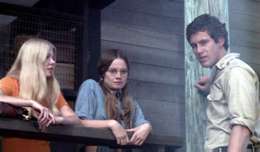 A considerably nastier piece of work from the same period, Girls on the Road (onscreen title: Hot Summer Week) is one of many early '70s films about a pair of cute young girls who hit the road for a good time. (Also see Teenage Hitchhikers, And Soon the Darkness, and To Be Twenty, to name just a few.) Somehow every film with this premise turned out to be very, very weird, and this one's no exception. Fresh out of high school, Karen (The Onion Field's Dianne Hull) and the more inhibited Debbie (Dark Shadows' Kathleen Cody, playing way against type) decide to spend the summer cruising the California coastline looking for a good time and pick up a traumatized Vietnam vet, Will (a baby-faced Michael Ontkean, fresh off Bert I. Gordon's Necromancy). After some misadventures and lots of romantic banter, they all wind up at a commune (run by Ralph Waite, the dad from The Waltons!) where their peaceful hippie life is complicated by the fact that there's a sex killer on the loose. Pandemonium eventually erupts. Though the script is a complete mess, the film has its lo-fi charms thanks to the locations (at times feeling like a grindhouse version of The Sandpiper) and better performances than the material demands. (You can visit Temple of Schlock for an interesting, thorough breakdown of the film's rocky road to filming, which is useful info when you're actually watching it.) Much of the film doesn't rise above the technical level of Harry Novak helmer Bethel Buckalew, right down to the cutesy "found" opening credits on newspapers and bumper stickers; however, its dippy mix of seaside free love and cheap psycho thrills definitely gives it a unique flavor. The DVD features a very nice anamorphic transfer that easily blows away the terrible VHS versions, along with a hefty roster of extras including a video interview with writer David M. Kaufman, a video remembrance by David Walsh (a friend of late director Tom Schmidt), the original trailer, and an alternate opening credit sequence featuring the more familiar title.
A considerably nastier piece of work from the same period, Girls on the Road (onscreen title: Hot Summer Week) is one of many early '70s films about a pair of cute young girls who hit the road for a good time. (Also see Teenage Hitchhikers, And Soon the Darkness, and To Be Twenty, to name just a few.) Somehow every film with this premise turned out to be very, very weird, and this one's no exception. Fresh out of high school, Karen (The Onion Field's Dianne Hull) and the more inhibited Debbie (Dark Shadows' Kathleen Cody, playing way against type) decide to spend the summer cruising the California coastline looking for a good time and pick up a traumatized Vietnam vet, Will (a baby-faced Michael Ontkean, fresh off Bert I. Gordon's Necromancy). After some misadventures and lots of romantic banter, they all wind up at a commune (run by Ralph Waite, the dad from The Waltons!) where their peaceful hippie life is complicated by the fact that there's a sex killer on the loose. Pandemonium eventually erupts. Though the script is a complete mess, the film has its lo-fi charms thanks to the locations (at times feeling like a grindhouse version of The Sandpiper) and better performances than the material demands. (You can visit Temple of Schlock for an interesting, thorough breakdown of the film's rocky road to filming, which is useful info when you're actually watching it.) Much of the film doesn't rise above the technical level of Harry Novak helmer Bethel Buckalew, right down to the cutesy "found" opening credits on newspapers and bumper stickers; however, its dippy mix of seaside free love and cheap psycho thrills definitely gives it a unique flavor. The DVD features a very nice anamorphic transfer that easily blows away the terrible VHS versions, along with a hefty roster of extras including a video interview with writer David M. Kaufman, a video remembrance by David Walsh (a friend of late director Tom Schmidt), the original trailer, and an alternate opening credit sequence featuring the more familiar title.
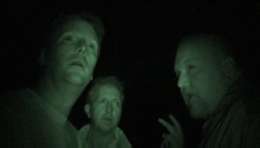 "Was the Sasquatch here before the Indians?" A conversation starter like that can mean only one thing; yep, more excursions into the freaky and unexplained from Reality Films. The Wild Man of Kentucky spends a mind-boggling two hours exploring the area of Panther Rock, a terrain haunted by weird stories of hair-covered beasts skulking in the dark and preying on house pets. The usual Amiga-esque computer graphics, talking heads, and copious night vision footage highlight the various stories about the area, where Bigfoot (or Bigfoots) stomp about to this day. Or maybe not. There isn't a whole lot of scientific method here, but the explorers' tales are fun in a spooky campfire sort of way. Add in a truly bizarre soundtrack that mixes death metal, backwoods fiddling, and guitar rock, and you've got a pretty wild one indeed. Pair this one up with Shriek of the Mutilated for maximum neural-shredding effect.
"Was the Sasquatch here before the Indians?" A conversation starter like that can mean only one thing; yep, more excursions into the freaky and unexplained from Reality Films. The Wild Man of Kentucky spends a mind-boggling two hours exploring the area of Panther Rock, a terrain haunted by weird stories of hair-covered beasts skulking in the dark and preying on house pets. The usual Amiga-esque computer graphics, talking heads, and copious night vision footage highlight the various stories about the area, where Bigfoot (or Bigfoots) stomp about to this day. Or maybe not. There isn't a whole lot of scientific method here, but the explorers' tales are fun in a spooky campfire sort of way. Add in a truly bizarre soundtrack that mixes death metal, backwoods fiddling, and guitar rock, and you've got a pretty wild one indeed. Pair this one up with Shriek of the Mutilated for maximum neural-shredding effect.
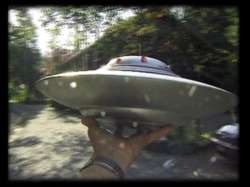 Also from Reality is the equally befuddlingThe Billy Meier Story, a globe-hopping chronicle of a Swiss man who reportedly had alien contact as a boy and gained the ability to predict major events and catastrophes which resulted in several assassination attempts. In between hunting down serial killers and serving as an advisor for world leaders, this renaissance man of the uncanny maintains contact with UFOs also sighted by his nearby residents. Apparently it's all connected to a race called the Plejaran whose 770-year-old ruler established our societal order and who now control the fate of the world. Well, this will undoubtedly be made into a Roland Emmerich film in the near future, but in the meantime we have this collage of interviews, graphics, photos, drawings, and home movies that certainly paints a bizarre, colorful picture. Both titles are presented in 1.78:1 anamorphic widescreen and come with additional snippets and outtakes to pad out the package, though the fact that these are both much longer than their average titles should also count for something.
Also from Reality is the equally befuddlingThe Billy Meier Story, a globe-hopping chronicle of a Swiss man who reportedly had alien contact as a boy and gained the ability to predict major events and catastrophes which resulted in several assassination attempts. In between hunting down serial killers and serving as an advisor for world leaders, this renaissance man of the uncanny maintains contact with UFOs also sighted by his nearby residents. Apparently it's all connected to a race called the Plejaran whose 770-year-old ruler established our societal order and who now control the fate of the world. Well, this will undoubtedly be made into a Roland Emmerich film in the near future, but in the meantime we have this collage of interviews, graphics, photos, drawings, and home movies that certainly paints a bizarre, colorful picture. Both titles are presented in 1.78:1 anamorphic widescreen and come with additional snippets and outtakes to pad out the package, though the fact that these are both much longer than their average titles should also count for something.
 Any film that begins with the director romping naked in a field with Dick Cheney's face bouncing on his manhood obviously won't be everyone's cup of tea, but that doesn't begin to scratch the surface of Meat Weed America, Aidan Dillard's berserk follow-up to his micro-budgeted pot/mutant/sex fusion, Meat Weed Madness. The extremely loose excuse for a plot takes place at Meatweed Manor, where topless girls farm lots of pot for Lord Meatweed when they aren't all busy having orgies. Enter Bin Smokin (Shortbus' Peter Stickles), a ticked-off terrorist who wants to mete out punishment for being circumcised against his will. Naked nuns, naked body piercing and suspension, naked suicide bombers, and naked girls making out with a guy in a giant cow head are just a few of the strange sights on display, all edited in a blender so quickly your eyes might not even process what they've seen. You can't call this shot-on-video attempt at provocation anything close to a "good" movie, but its gleeful, go-for-broke enthusiasm carries it a lot further than it probably should. Troma vets Debbie Rochon and Lloyd Kaufman are also on hand, which makes sense as Troma also released this DVD. Image quality is about on par with something that looks like it was shot on a DV camcorder, but the extras are solid including a mammoth making-of documentary that covers pretty much every big set piece in the film, sometimes in borderline clinical detail. Other extras include bonus director's shorts and videos (mostly loud and incoherent), an uncensored intro with Dillard's bouncing manhood almost assaulting the camera, a "sexy" slide show, and promos for both films in this series; if it winds up turning into a trilogy, God help us all.
Any film that begins with the director romping naked in a field with Dick Cheney's face bouncing on his manhood obviously won't be everyone's cup of tea, but that doesn't begin to scratch the surface of Meat Weed America, Aidan Dillard's berserk follow-up to his micro-budgeted pot/mutant/sex fusion, Meat Weed Madness. The extremely loose excuse for a plot takes place at Meatweed Manor, where topless girls farm lots of pot for Lord Meatweed when they aren't all busy having orgies. Enter Bin Smokin (Shortbus' Peter Stickles), a ticked-off terrorist who wants to mete out punishment for being circumcised against his will. Naked nuns, naked body piercing and suspension, naked suicide bombers, and naked girls making out with a guy in a giant cow head are just a few of the strange sights on display, all edited in a blender so quickly your eyes might not even process what they've seen. You can't call this shot-on-video attempt at provocation anything close to a "good" movie, but its gleeful, go-for-broke enthusiasm carries it a lot further than it probably should. Troma vets Debbie Rochon and Lloyd Kaufman are also on hand, which makes sense as Troma also released this DVD. Image quality is about on par with something that looks like it was shot on a DV camcorder, but the extras are solid including a mammoth making-of documentary that covers pretty much every big set piece in the film, sometimes in borderline clinical detail. Other extras include bonus director's shorts and videos (mostly loud and incoherent), an uncensored intro with Dillard's bouncing manhood almost assaulting the camera, a "sexy" slide show, and promos for both films in this series; if it winds up turning into a trilogy, God help us all.
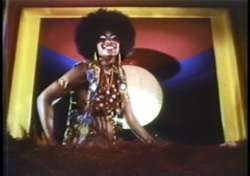 One of the more enigmatic erotic filmmakers of the '70s, Eduardo Cemano was essentially forgotten until After Hours revived two of his standout early films for their Weirdos and the Oddballs Collection. Now they've all returned with a much wilder triple feature, Eduardo Cemano's Sexual Healing Trilogy, offering his next three films together in a set that's a lot closer to George Kuchar than any random porn director. In fact, the After Hours label is somewhat misleading in this case; apart from maybe two minutes of swirling, wildly edited fornication footage in the third film, this is strictly softcore fare with an experimental bent that will surprise anyone expecting the usual bump and grind. First up is The Healers, a gonzo parody of white coater "educational" quickies with Cemano himself providing the wraparound material as a giddy doctor introducing the concept of "orgasmic free flow" as a method of introducing natural healing. This theory is put into practice by our protagonist (played by the mysterious "Eberhard Ellis"), a doctor who treats his patients' physical and psychological maladies through carnal means (including a pretty surprising bisexual foursome featuring porn vet Levi Richards). Eventually both doctors get to find their own satori through sex as well for the appropriately over-the-top ending. Goofy, energetic, and a far cry from the rougher direction softcore was exploring in 1972, it's a nifty little discovery, presented here full frame from what appears to be an older but certainly watchable tape master. Things really get bizarre with feature number two, Fongaluli, in which a sexual scientist in the Caribbean decides to experiment with the rare fongaluli leaf, which can apparently erase the carnal barriers between the species (depicted vividly in a fantasy sequence involving naked actors in animal masks). For some reason he decides to apply this treatment to a lobster, which turns into a beautiful woman who needs a constant supply of good lovin' to retain her form. Yeah, it's basically a dirty version of The Little Mermaid on acid in the tropics. Some incestuous (white) natives, smut favorite Ultramax as the "Fongawitch," and a giant naked woman straight out of Fellini add to the weirdness before our mismatched couple finally figure out a solution to their problem. Simply put, this movie is nuts! Despite the hefty amount of nudity, it's more art film than smut with an atmosphere that could only have been created in the early '70s. Distorted photography, bright colors, and completely bizarre plot twists make it a ride unlike any other, presented here in a new film transfer with anamorphic enhancement (which appears to squish things a little too harshly, so you might want to adjust your TV a bit to compensate). Finally the second disc features movie three, Madame Zenobia, another meditation on unorthodox sexual treatment with widowed Tina Russell unable to find any physical pleasure except at her dead husband's grave or in front of a mirror. Needless to say, her fiance (Levi Richards again) isn't too thrilled and stomps off in a huff. Three of her friends show up naked except for some banana body ornamentation for an impromptu gang bang that doesn't go off as planned, so they haul her off to the nearby house of Madame Zenobia, a sexual hoodoo priestess who might hold the key to teaching our heroine how to get her groove back. It's a visually striking and atmospheric film that was probably pretty dazzling in first run prints, but the tape master used here has faded badly and turns mushy too often for comfort; still, it's great to have this preserved in some form, and it can only continue to enhance the director's reputation. Speaking of which, Cemano turns up here again for video interviews and audio commentaries (moderated by Michael J. Bowen, who also provides the excellent, very detailed liner notes with tons of interesting production and financial backing history) in which he talks about his relationships with the actors at the time, his theories on sexual therapy, his subsequent career paths after giving up filmmaking short afterwards, and much more. An additional interview with Betty Dodson, Ph.D., continues the thematic thread of the films which demonstrate clearly that all of society's ills could easily be cured if everyone just relaxed and got laid a lot more often.
One of the more enigmatic erotic filmmakers of the '70s, Eduardo Cemano was essentially forgotten until After Hours revived two of his standout early films for their Weirdos and the Oddballs Collection. Now they've all returned with a much wilder triple feature, Eduardo Cemano's Sexual Healing Trilogy, offering his next three films together in a set that's a lot closer to George Kuchar than any random porn director. In fact, the After Hours label is somewhat misleading in this case; apart from maybe two minutes of swirling, wildly edited fornication footage in the third film, this is strictly softcore fare with an experimental bent that will surprise anyone expecting the usual bump and grind. First up is The Healers, a gonzo parody of white coater "educational" quickies with Cemano himself providing the wraparound material as a giddy doctor introducing the concept of "orgasmic free flow" as a method of introducing natural healing. This theory is put into practice by our protagonist (played by the mysterious "Eberhard Ellis"), a doctor who treats his patients' physical and psychological maladies through carnal means (including a pretty surprising bisexual foursome featuring porn vet Levi Richards). Eventually both doctors get to find their own satori through sex as well for the appropriately over-the-top ending. Goofy, energetic, and a far cry from the rougher direction softcore was exploring in 1972, it's a nifty little discovery, presented here full frame from what appears to be an older but certainly watchable tape master. Things really get bizarre with feature number two, Fongaluli, in which a sexual scientist in the Caribbean decides to experiment with the rare fongaluli leaf, which can apparently erase the carnal barriers between the species (depicted vividly in a fantasy sequence involving naked actors in animal masks). For some reason he decides to apply this treatment to a lobster, which turns into a beautiful woman who needs a constant supply of good lovin' to retain her form. Yeah, it's basically a dirty version of The Little Mermaid on acid in the tropics. Some incestuous (white) natives, smut favorite Ultramax as the "Fongawitch," and a giant naked woman straight out of Fellini add to the weirdness before our mismatched couple finally figure out a solution to their problem. Simply put, this movie is nuts! Despite the hefty amount of nudity, it's more art film than smut with an atmosphere that could only have been created in the early '70s. Distorted photography, bright colors, and completely bizarre plot twists make it a ride unlike any other, presented here in a new film transfer with anamorphic enhancement (which appears to squish things a little too harshly, so you might want to adjust your TV a bit to compensate). Finally the second disc features movie three, Madame Zenobia, another meditation on unorthodox sexual treatment with widowed Tina Russell unable to find any physical pleasure except at her dead husband's grave or in front of a mirror. Needless to say, her fiance (Levi Richards again) isn't too thrilled and stomps off in a huff. Three of her friends show up naked except for some banana body ornamentation for an impromptu gang bang that doesn't go off as planned, so they haul her off to the nearby house of Madame Zenobia, a sexual hoodoo priestess who might hold the key to teaching our heroine how to get her groove back. It's a visually striking and atmospheric film that was probably pretty dazzling in first run prints, but the tape master used here has faded badly and turns mushy too often for comfort; still, it's great to have this preserved in some form, and it can only continue to enhance the director's reputation. Speaking of which, Cemano turns up here again for video interviews and audio commentaries (moderated by Michael J. Bowen, who also provides the excellent, very detailed liner notes with tons of interesting production and financial backing history) in which he talks about his relationships with the actors at the time, his theories on sexual therapy, his subsequent career paths after giving up filmmaking short afterwards, and much more. An additional interview with Betty Dodson, Ph.D., continues the thematic thread of the films which demonstrate clearly that all of society's ills could easily be cured if everyone just relaxed and got laid a lot more often.
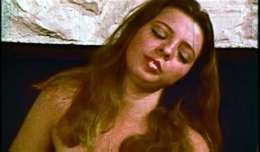 On the other hand, After Hours' Grindhouse Virgin Part 2 Triple Feature definitely qualifies for that company's banner. As the cover proudly announces, all three titles have never been on home video (I'll take their word for it) and are mainly worth checking out for two appearances by fresh-faced starlet Rene Bond in the earliest days of her transition from softcore comedies to equally frivolous hardcore ones. To get there you first have to slog through Virgin Forest, a mid-'70s cheapie about a bunch of schlubby guys in the woods who somehow keep coming across ready-to-peel women (none of whom appear to be anything close to virginal) and all wind up having an orgy back at their cabin. The end. No one looks familiar, and while the cross cutting between the various encounters is a little more ambitious than usual, it's all pretty drab and forgettable. Better in smut value (if not print quality -- it looks pretty ragged) is Virgin Maid, in which a madam running a suburban whorehouse entertains a lot of clients, with Rene Bond popping up fleetingly for no apparent reason. There's zero story here, but it's all pretty bouncy, flesh-filled '70s nonsense with everyone squirming around on eye-punishing furniture. Last up is the best of the bunch, I'm No Virgin, with '70s grindhouse regular Sandy Carey starring as a pretty messed-up girl who goads her widower dad into jumping her, only to run off to college where she finds a new calling selling her body from the new environs of student apartment housing. Of course, there's a twist ending as well. Rene Bond appears again here along with her then-boyfriend, Ric Lutze, who seemed to be joined at her hip at the time. This one's strictly softcore except for what appears to be a slip-up during the climactic living room orgy, which catches Rene getting a little more enthusiastic than directed. All three films are presented in anamorphic widescreen, which seems pretty questionable with the latter two features but doesn't seem to outright wreck any of the compositions. Extras include the usual cross promotion trailers and appreciative liner notes by "The After Hours Collector."
On the other hand, After Hours' Grindhouse Virgin Part 2 Triple Feature definitely qualifies for that company's banner. As the cover proudly announces, all three titles have never been on home video (I'll take their word for it) and are mainly worth checking out for two appearances by fresh-faced starlet Rene Bond in the earliest days of her transition from softcore comedies to equally frivolous hardcore ones. To get there you first have to slog through Virgin Forest, a mid-'70s cheapie about a bunch of schlubby guys in the woods who somehow keep coming across ready-to-peel women (none of whom appear to be anything close to virginal) and all wind up having an orgy back at their cabin. The end. No one looks familiar, and while the cross cutting between the various encounters is a little more ambitious than usual, it's all pretty drab and forgettable. Better in smut value (if not print quality -- it looks pretty ragged) is Virgin Maid, in which a madam running a suburban whorehouse entertains a lot of clients, with Rene Bond popping up fleetingly for no apparent reason. There's zero story here, but it's all pretty bouncy, flesh-filled '70s nonsense with everyone squirming around on eye-punishing furniture. Last up is the best of the bunch, I'm No Virgin, with '70s grindhouse regular Sandy Carey starring as a pretty messed-up girl who goads her widower dad into jumping her, only to run off to college where she finds a new calling selling her body from the new environs of student apartment housing. Of course, there's a twist ending as well. Rene Bond appears again here along with her then-boyfriend, Ric Lutze, who seemed to be joined at her hip at the time. This one's strictly softcore except for what appears to be a slip-up during the climactic living room orgy, which catches Rene getting a little more enthusiastic than directed. All three films are presented in anamorphic widescreen, which seems pretty questionable with the latter two features but doesn't seem to outright wreck any of the compositions. Extras include the usual cross promotion trailers and appreciative liner notes by "The After Hours Collector."
PREVIOUS SICK PICKS:
June 15, 2010
November 16, 2009
August 6, 2009
June 11 , 2009
March 19, 2009
October 27, 2008
August 7, 2008
July 25, 2008
May 31, 2008 (Aussie Special)
February 19, 2008
January 8, 2008
October 23, 2007
October 8, 2007
September 29, 2007
![]()